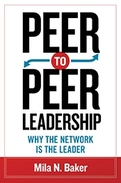2008
•Offers a systematic approach to developing your networking skills—including an “NQ test” to help you quantify your networking ability
•Features tools and techniques specific to each type of network, as well as advice from leading executives, researchers, and thought leaders
•Copublished with ASTD, the leading association for human resource development professionals
The idea of hierarchy is breaking down everywhere, from politics to religion to social relationships-why should leadership be any different?
Our leadership models are stuck in an Industrial Age, top-down mentality. But in our complex, data-drenched, 24/7 world, there is simply too much information coming from too many different directions too quickly for any one leader or group to stay on top of it. Hierarchy is breaking down everywhere—why should leadership be any different? Inspired by the peer-to-peer model of computing used in social networking and crowdsource technologies, Mila Baker shows a new way to lead. Organizations, she says, must become networks of "equipotent" nodes of power—peer leaders. The job of the leader is now to set the overall goals and direction and optimize the health of that network, not tell it what to do. In these organizations, leadership roles shift rapidly to fit the needs of any given situation. Information flows freely so those who need it can find it easily and act on it immediately. Feedback becomes an organic part of the workflow, enabling rapid course corrections. Baker shows how companies like Gore and Herman Miller have achieved long-term success practicing these principles and provides a structure that any organization can adapt to build flexibility, resiliency, and accountability.Zack politely examines and then smashes to tiny fragments the “dusty old rules” of standard networking advice. She shows how the very traits that make many people hate networking can be harnessed to forge an approach more effective and user-friendly than traditional techniques. This edition adds new material on applying networking principles in personal situations, handling interview questions, following up—what do you do with all those business cards?—and more.
Networking enables you to accomplish the goals that are most important to you. But you can't adopt a style that goes against who you are—and you don't have to. As Zack writes, “You do not succeed by denying your natural temperament; you succeed by working with your strengths.”

Much networking advice assumes that you need to be an off the chart extrovert to succeed. Nothing could be further from the truth. In this video workshop, Devora Zack proves that real networking means working with – rather than fighting against – your natural personality.
Zack, an avowed introvert and a successful consultant who speaks to thousands of people every year, shatters stereotypes about people who dislike networking. She then provides an innovative, customized system of networking that leverages your own unique strengths.
This video shows you how to forge meaningful, lasting connections in all kinds of situations, not just formal networking events. With the help of engaging exercises, you’ll learn techniques for cultivating your networking “A” game, while remaining true to yourself.
Understand why both introverts and extroverts possess natural skills for networking
Gain a “network survival kit” to survive and thrive at networking events
Discover how the five components of a well-formed goal can help you achieve your networking objectives
Learn how to make a positive first impression and how to end a conversation gracefully
Master methods to host a dynamic networking event
Prepare networking strategies for business trips and conferences
Apply versatile tools to launch and organize a job search
Learn the best approaches to following up with contacts
Devora Zack, CEO of Only Connect Consulting, is a global keynote speaker, consultant, and coach with 100+ clients such as Cornell University, Smithsonian, Australian Institute of Management, U.S. Department of Education, and Mensa. Her books, Singletasking, Networking for People Who Hate Networking, and Managing for People Who Hate Managing, are published in over 25 languages. She has been featured on ABC-TV, Fox Business, USA Today, Wall Street Journal, Forbes, and Fast Company.
- Details a practical, 10-step plan that can create exciting new relationships between businesses and nonprofits
- Weeden's plan could generate an additional $3 billion a year in corporate support for vital causes, improving quality of life for millions, while at the same time bolstering corporate profits
- Offers essential advice for businesses planning their corporate social investing strategies and nonprofits seeking corporate support
Offers a detailed, reliable, and proven approach to rigorously evaluating and increasing the social impact of philanthropic efforts.
Product: Online streamed self-assessment application (not downloaded), limited one-year subscription (5 tests or 12 months, whichever comes first), password controlled
Duration: The Assessment for Investors has 24 questions in seven categories. The Assessment for Operators has 24 questions in six categories. Each self-assessment takes 5-10 minutes to answer.
Results: You will receive a radar graph for both the Investor and Operator. The coauthors also offer detailed interpretation of your results from both the investor and operator perspectives. By reading your results, you can get important insights on how aligned you are with your organization, and how you can move towards better alignment. There are also opening and closing statements from the author, the ability to compare current and former results, and a print option.
BASED ON THE BOOK, MEASURING AND IMPROVING SOCIAL IMPACTS. Book summary: The world is beset with enormous problems that desperately need solutions. And as a nonprofit, NGO, foundation, impact investor, or socially responsible company, your organization is on a mission to provide those solutions.
But what exactly should you do? And how will you know whether it's working? Too many people assume that good intentions will result in meaningful actions and leave it at that. But thanks to Marc Epstein and Kristi Yuthas, social impact can now be evaluated with the same kind of precision achieved for any other organizational function.
Based on years of research and analysis of field studies from around the globe, Epstein and Yuthas offer a five-step process that will help you gain clarity about the impacts that matter most to you and will provide you with methods to measure and improve those impacts. They offer a systematic approach to deciding what resources you should invest, what problem you should address, and which activities and organizations you should support. Once you've made those decisions, they provide tools, frameworks, and metrics for defining exactly what success looks like, even for goals like reducing global warming or poverty that are extremely difficult to measure. Then they show you how to use the data you've gathered to further develop and increase your social impact.
Epstein and Yuthas personally interviewed leaders at over sixty different organizations for this book and include examples from nearly a hundred more. This is unquestionably the most complete, practical, and thoroughly researched guide to taking a rigorous, data-driven approach to expanding the good you do in the world.
PURCHASER AND USER NOTE: If you are an individual consumer newly purchasing the assessment, go directly to the shopping cart by clicking the "add to cart" icon to your left. If you are a member of an organization that has purchased a bulk order, or if you already bought the assessment in the last 12 months and are retaking it now using the original Access Key to retake the assessment please log in here. New registrants: Please enter your "Access Key" into the input field to enter the self-assessment for the first time (see bottom of page under "Please Note" for Social Impact Self-Assessment login link). A note to frequent purchasers: You cannot use your current bkconnection.com password for this product; you must create and use a new password. For any questions, please contact the support desk at 800-929-2929 (8 am-9 pm Eastern U.S. time, Monday through Friday), or [email protected]. Thank you.




















